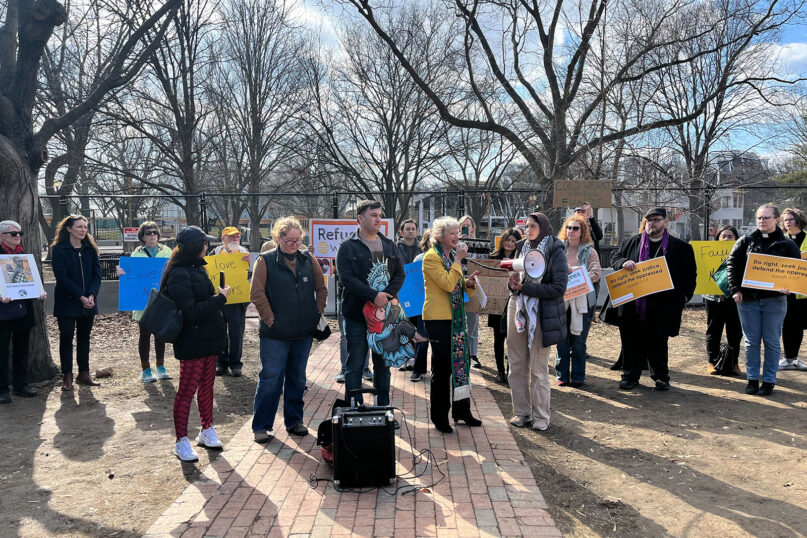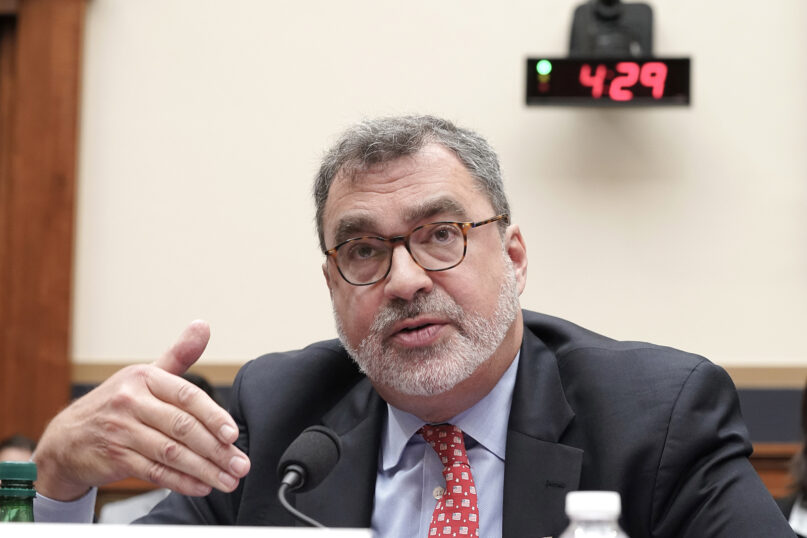WASHINGTON (RNS) — Faith-based groups that partner with the federal government to resettle refugees are facing widespread layoffs and furloughs after President Donald Trump’s administration suspended the refugee program and, according to one of the faith groups, refuses to reimburse the organizations for humanitarian work performed before the president assumed office.
Matthew Soerens, vice president of advocacy and policy at World Relief, an evangelical Christian group that resettles refugees, said his organization continues to reel from several actions taken by Trump over the past two weeks. The president all but froze the U.S. refugee program save for rare exceptions in an executive order shortly after taking office, a move that outraged the 10 groups that help the government resettle refugees — seven of which are faith-based.
Soerens said his office also received communication from the government on Jan. 24 stating that World Relief would no would no longer be reimbursed for any work beyond that day.
The news was devastating, Soerens said, because his organization typically maintains a 90-day commitment to every refugee it resettles, helping pay for rent, basic supplies and other resources during that time. The sudden halt on funding meant World Relief staffers were left scrambling to figure out how to support the roughly 4,000 people the group had resettled over the past 90 days.

Matthew Soerens. (Photo courtesy World Relief)
“For some it was only another few weeks where we would have been covering rents,” Soerens said. ”But for some that arrived a week before, we have three months’ worth of rent to figure out.”
Soerens said his group is also impacted by Trump’s executive order pausing foreign aid efforts, which halted work World Relief does abroad in partnership with local churches through an agreement with the U.S. Agency for International Development. The combined result of the administration’s actions was a roughly $8 million shortfall for the group, and while World Relief has managed to raise $2 million in recent days — an effort, Soerens said, that was “like nothing we’ve ever done” — staff remains unsure how the organization will fund the rest.
“We’re having to make very difficult decisions, because we are going to prioritize rent checks over staffing,” he said, noting there have been furloughs throughout the organization in recent days.
Representatives for Church World Service, one of the other faith-based refugee resettlement agencies, said the federal government is also refusing to reimburse their organization for work done prior to Trump assuming office.
“We’ve been unable to access federal reimbursements for critical program costs, and that includes costs that were incurred prior to the issuance of the executive order,” Mary Elizabeth Margolis, a spokesperson for CWS, said in an interview. “We still have outstanding reimbursements for services rendered under contract with the federal government that are not being paid back to us.”
Margolis said that, as at World Relief, the result has been furloughs throughout the organization, with administrators hoping the money saved will allow the remaining staff to care for resettled refugees. That includes making sure they are “not left homeless or without access to medical care” — very real concerns for some families they work with, she said.
At a rally outside the White House in support of the refugee groups on Tuesday (Feb. 4), several furloughed CWS workers joined the protest. Speakers, such as the Rev. Sharon Stanley-Rea, the head of CWS’ national office, said more than two-thirds of its national staff had been furloughed, including 100% of the D.C. office. She also pointed out that some of the staff were refugees themselves.

The Rev. Sharon Stanley-Rea, center, speaks during a protest against the shuttering of the United States Refugee Admissions Program (USRAP), Tuesday, Feb. 4, 2025, near the White House in Washington. (RNS photo/Aleja Hertzler-McCain)
On Monday, Elon Musk, the billionaire head of the Department of Government Efficiency and owner of the social media platform X, quoted a post from another X user detailing a grant provided to CWS that appeared geared toward assisting refugees abroad with their applications. Legal immigrants are typically vetted over the course of years, but Musk suggested in his post, without evidence, that the CWS grant was part of a broader redirection of funds — “billions of dollars,” Musk claimed — for “facilitating illegal immigration.”
“Is this America, when we’re cutting off refugee aid for just rental assistance and food for three months?” said Rep. Jamie Raskin, a Maryland Democrat, who also spoke at the protest.
He then noted the Trump family’s own immigration history.
“The Trump administration has decided to slam the door shut on refugees,” Raskin said. “What a betrayal of America and our values. Nobody slammed the door shut in the face of the Trump family from Germany. Nobody slammed the door shut in the face of Melania Trump, who got an O1 and EB1 visa for extraordinary ability.
“Nobody slammed the door on Elon Musk, who came from racist, apartheid South Africa, who came here on an F1 student visa,” the congressman added, before referencing a Washington Post report indicating Musk also worked in the U.S. illegally as he launched his entrepreneurial career.
The State Department did not respond to a request to confirm claims by CWS and the other agencies, or explain the rationale behind the halted funds.
In an emailed statement, the Rev. Noel Andersen, the national field director for CWS, said the financial woes hinder the ability to do work inspired by his faith.
“Part of living out my faith is through advocating for welcoming policies alongside immigrants and refugees, consistent with the Christian tradition and sacred texts,” he said. “As our organization goes through furloughs, our capacity to fulfill our mission has been severely undercut, which will have a long-lasting harmful impact to those refugees who desperately need services that will reverberate across our communities and congregations.”

FILE – Mark Hetfield speaks during a House Judiciary subcommittee, Tuesday, May 23, 2023, on Capitol Hill in Washington. (AP Photo/Mariam Zuhaib)
The story is the same at several other refugee resettlement groups, with some faring worse than others. Reached via text message on Monday, Mark Hetfield, head of HIAS, a Jewish group, said his organization has laid off staff or terminated their positions to handle the financial strain.
Hetfield framed the efforts as an attempt to scrape together whatever resources HIAS still has for the refugees it has committed to, while also voicing frustration with the Trump administration’s actions.
“For resettled refugees the government must live up to that obligation, as must we,” Hetfield said.
Episcopal Migration Ministries, a smaller refugee resettlement group, announced significant layoffs Friday. Episcopal Church Presiding Bishop Sean Rowe announced that 22 staff members whose positions were funded by federal grants would be laid off, leaving the ministry with just 14 staff to carry out services for “forced migrants” who arrived just before Trump took office.
Sarah Shipman, director of Episcopal Migration Ministries, told RNS, “The end of federal funding for Episcopal Migration Ministries does not mean an end for EMM. While we do not know exactly how this ministry will evolve in our church’s future, we remain steadfast in our commitment to stand with migrants and to our congregations who serve them.”
The agencies stressed that the staff reductions are ultimately a symptom of a much larger issue: that the refugees they work with, many of whom have fled violence and religious persecution for a new life in the U.S., will go underserved.
“They are the people who have pending asylum cases that may lose access to their lawyers,” said Margolis of CWS. “They are families who need emergency rental support, who may end up homeless. They are kids who come to our offices to get coats and hats because it’s cold outside.”
Now, she said, those families “might not have access to those basic supplies.”
Catholic Relief Services, which is the top recipient of funding from the U.S. Agency for International Development, urged supporters to contact members of Congress to ask them to intervene with Trump to ensure that CRS would be able to provide clean water, food assistance and medical assistance normally funded through by the U.S.’ foreign aid program.
“This freeze will be detrimental to millions of our sisters and brothers who need access to lifesaving humanitarian, health and development assistance,” the organization, an arm of the U.S. Conference of Catholic Bishops, wrote regarding major changes to USAID announced in recent days. “U.S. foreign aid is not a handout. It has real impact on human life and dignity and advances U.S. national interests.”
The organization assured supporters that “constituents’ voices have significant influence on congressional members’ decision-making,” especially when messages are personalized.















